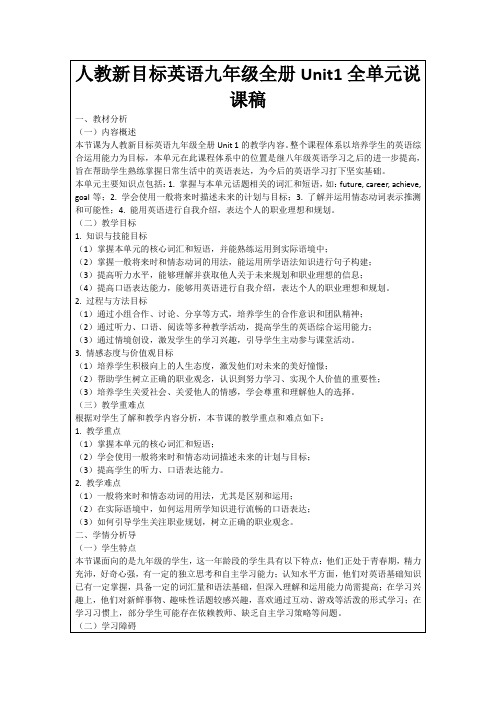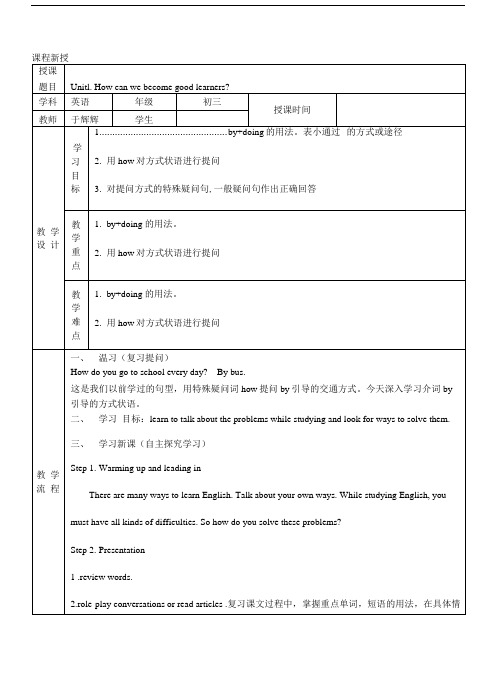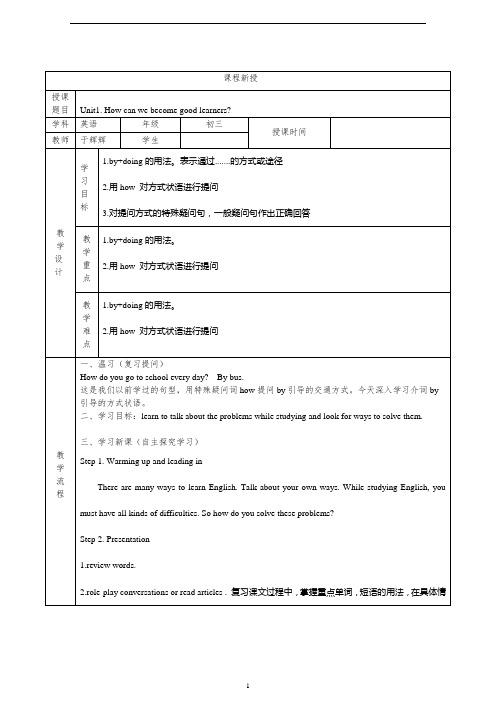人教版九年级英语U1讲义
Unit1SectionA知识点讲解课件人教版九年级英语全册

例如: Please read this poem aloud.请朗读这首诗。 The TV program is too loud.Please turn it down.电视节目太吵了。请把音量调低些。 The boy shouted as loudly as he could.这个男孩尽可能大声地叫。
【对点练】 这需要很多时间,所以你必须有耐心,年轻人。It will take a lot of time,so you must __________,young man.
be patient
“the+比较级…,the+比较级…”结构
though/although
look up 的固定搭配
【教材原文】But because I wanted to understand the story, I looked them up in a dictionary.但是,因为我想了解这个故事,所以我在词典里查阅了一下它们。 look up是固定搭配,意为“(在词典、参考书中或通过电脑)查阅”。当它的宾语是名词时,该名词宾语可以位于look和 up之Байду номын сангаас,也可以位于up之后;当它的宾语是代词时,该代词宾语只能位于 look和up之间。例如: I don't know this new word.Please help me look it up in a dictionary.我不认识这个生词。请帮我在词典里查一下。
Students can use the dictionary to look up new words/look new words up.
Ⅰ.请根据课本2d完成短文填空。
人教新目标英语九年级全册Unit1全单元说课稿

5.个性化教学:关注每个学生的特点和需求,给予个性化的指导和建议,帮助他们找到适合自己的学习方法,提高学习效果。
三、教学方法与手段
(一)教学策略
我将采用任务型教学法、情境教学法和合作学习法作为主要教学方法。选择这些方法的理论依据如下:
(2)掌握一般将来时和情态动词的用法,能运用所学语法知识进行句子构建;
(3)提高听力水平,能够理解并获取他人关于未来规划和职业理想的信息;
(4)提高口语表达能力,能够用英语进行自我介绍,表达个人的职业理想和规划。
2.过程与方法目标
(1)通过小组合作、讨论、分享等方式,培养学生的合作意识和团队精神;
(2)通过听力、口语、阅读等多种教学活动,提高学生的英语综合运用能力;
(二)新知讲授
在新知讲授阶段,我将逐步呈现知识点,引导学生深入理解:
1.呈现词汇:通过图片、实物等辅助手段,呈现本节课的核心词汇和短语,让学生在直观感知中记忆和理解。
2.语法讲解:结合具体例句,讲解一般将来时和情态动词的用法,让学生通过模仿和实践,掌握语法知识。
3.对话展示:展示与本节课话题相关的对话,引导学生关注对话中的语言表达,学习如何在实际语境中运用所学知识。
板书在教学过程中的作用主要有:帮助学生梳理知识结构,强化重点和难点;作为视觉辅助工具,帮助学生记忆和理解;为学生的课堂笔记提供参考。
为确保板书清晰、简洁且有助于学生把握知识结构,我将遵循以下原则:
1.突出重点:只列出关பைடு நூலகம்信息,避免冗余内容。
2.逻辑清晰:按照知识点之间的逻辑关系进行布局,使学生更容易理解。
(3)如何引导学生关注职业规划,树立正确的职业观念。
Unit1讲义 人教版英语九年级全册

Unit1 How can we become good learners?1.What about reading aloud to practice pronunciation? What about =How about Why don’t you... Why not... Would you like... Let’s...辨析: aloud,loud与loudlyaloud:(adv)大声地(与call,shout,cry等连用)(adv)出声地(与read等连用)Eg: Please read the text aloud.loud: (adj)大声的(可作定语或表语)Eg: The music is too loud.Please turn it down.(adv)响亮地;高声地(与speak,talk,sing,laugh等连用) Eg:Speak loud,please,or no one will hear you.loudly: (adv)高声地(含有喧闹的意味) (与knock,ring等连用) Eg: Suddenly the bell on the wall rang loudly.注意: ①前缀a(n)表示加强意义eg: aright正确地awake唤醒announce宣布;通告②a与名词或动词结合构成形容词/副词Eg: a+sleep (n.睡眠)=asleep (adj睡着的)a+side(n.边)=aside(adv在旁边)a+head(n.头)=ahead(adv在前面)a+live(v居住)=alive(adj活的)2.Why did Wei Fen find it difficult to learn English?此句的结构的: find it+adj+to do sth. 发现做某事...(其中it为形式宾语,真正的宾语是后面的动词不定式.句中adj为宾补)类似的结构还有:①make it+adj+to do sth. 使做某事...②think it+adj+to do sth. 认为做某事...其他几种“find+宾语+宾补”结构①find+宾语+adj 发现某人或某物Eg: She found the work very dull.②find+宾语+adv (其中副词通常是: in,out,up,down,upstairs等) Eg: I went to her house,but I found her out.③find+宾语+介词短语Eg: When he woke up,he found himself in hospital.④find+宾语+doing sth.Eg:Did you find a woman standing under the tree?⑤find+宾语+(to)do sth.Eg: I found Mary (to) clean the classroom.3.I was afraid to ask questions because of my poor pronunciation.辨析: be afraid to do sth.与be afraid of doing sth.be afraid to do sth. 害怕做某事. 根据经验或常识不敢去做某事,或没有勇气去做某事.Eg: He was afraid to go out at night.be afraid of doing sth. 表示担心会发生某事或某情况(但实际上未必会发生),或不敢做某事(指缺乏勇气或因害怕其后果而不敢)Eg: She was afraid of waking up her husband,for he was ill.4.Although I could not understand everything the characters said,... although (conj) 即使;纵然;虽然相当于though,两者可通用(用来引导让步状语从句,既可以位于主句之前,也可以位于主句之后)辨析: although与though①用作连词,表示“虽然”二者可互换,但although与though 更加正式.在同一个句子中,although与though不能与but连用,但可以与yet 连用.Eg: Although he was tired,he went on working.②Although一般不用作adv,而though可作adv,且一般位于句末,译为:可是;不过.Eg: It’s hard work;I enjoy it,though.③as though(好像;仿佛),even though(即使;纵然)等固定短语中。
人教版九年级全册Unit1课件 (共25张PPT)

listening to music when learning
sleeping in class
talking with other students in class
They are not good habits for learning English.
1. What does “Practice makes perfect.” mean? Keep practicing. 2. If successful learners make mistakes, what do they often do? They learn from mistakes.
Read, study and learn about everything imporant in your life
Read Paragraph 3 and answer the questions.
Practicing and learning from mistakes Good learners think about what they are good at and what they need to practice more. Remember, “Use it or lose it.” Even if you learn something well, you will forget it unless you use it. “Practice makes perfect.” Good learners will keep practicing what they have learned, and they are not afraid of making mistakes. Alexander Graham Bell did not invent the telephone overnight. He succeeded by trying many times and learning from his mistakes.
人教版英语初三Unit1讲义.doc

课程新授境中掌握基本句型。
让学生注意做好知识点标记。
%1such+ (形容词)+复数名词/不可数名词+that从句She is so lovely a girl that we love her very much.= She is such a lovely girly that we love her very much.pay attention to +名词/ doing注意什么/干什么make a difference to ...对.. 有影响be/get used to doing习惯于干什么make a contribution to X j ....... 有页献look forward to doing 期望干什么考点6.动名词考查:%1practice doing slh练习干某事%1keep doing sth 一直干某事%1miss doing sth思念干某事%1mind doing sth介意干某事%1enjoy doing sth喜欢干某事%1finish doing sth完成某事%1feel like doing sth想要干某事%1be busy doing sth忙于干某事%1can't help doing sth情不自禁地干某事%1have fun doing sth在干某事方面玩的愉快⑩ave trouble (in) doing sth在干某事方面有困难窿ive叩doing sth放弃干某事@)ut off doing sth推迟,延期干某事@>y doing sth ; be afraid of doing ; make a mistake in doing ;动名词中考中主要考查:及物动词后;介词后;和固定短语搭配的动名词;作主语的动名词,其作主语谓语要用单数形式。
考点7本单元易混淆的词和短语总结:(2)look常搭配短语区分:%1look up查找(跟代词作宾语,代词放中间)%1look after 照顾=take care of3.look out 当心,小心=be careful%1look through 浏览%1look for寻找%1look forward to doing 期待tell sb. to do sth告诉某人做某事what.. think of =how ...like /feel about(5)try短语区分:%1try on试穿%1try to do sth努力做某事【侧重尽力做】%1try doing sth试图做某事【侧重尝试做】%1try one's best to do sth= do one's best to do sth 尽某人最大努力做某事%1have a try试一试⑺need用法总结:%1人做主语,sb. need to do sth某人需要做某事%1物做主语,sth need doing sth= sth need to be done♦Students need(have) a good rest in studying.♦The watch needs(mend).%1用于否定句或疑问句,是情态动词♦needn't = don't have to 没有必要♦need ,must引导的一般疑问句,肯定会的用must,否定回答用need用may not; must用needn't.一MustI go there now?一Yes, you must / No, you needn'tread连用;大声地",常放于speak> talk> laugh、sing之后, 多用比较而不用loudly朗读课文与大声地读课文是有区别的。
人教版英语初三Unit1讲义

②I need a pen to write with.③I need some paper to write on.④There is no room for us to live(in).⒁aloud / loud/ loudly区分:①aloud adv,“大声地;出声地”,多指使别人听到的意味,常与read连用②loud adj、adv。
作adv时,“高声地;响亮地;大声地”,常放于speak、talk、laugh、sing之后,多用比较级loudly“高声地”,有时与loud通用。
但含有“喧闹”的③意味。
在用与比较级或最高级时,通常用loud而不用loudly◆Reading aloud is different from reading loudly.朗读课文与大声地读课文是有区别的。
◆Don’t talk so loud.不要那么高声的谈话。
◆in a loud voice 高声地◆Speak louder, please. I can’t hear you clearly.◆He does not talk loudly or laugh loudly in public.① What about ____________(大声读) to practice your spoken English?② The boys are talking____ in the class and it makes the teacher unhappy.A. aloudB. loudlyC. louderD. loud③ Don’t speak so ___, my boys, I’ll read ___ a story to you.A. loudly; aloudB. loudly; loudlyC. aloud; loudlyD. loud; loudly考点8 it的形式主语和形式宾语①It is + difficult/ hard / easy / important / necessary + for sb to do sth. 干某事对某人来说是怎么样的。
Unit 1 课件(共35张PPT) 人教版九年级全册
1) It is no use/ good / useless + doing... 2) It is a waste of time + doing ... 3) It is fun + doing ... 在以上结构中常用动名词作主语。 It’s no use crying over spilt milk. 覆水难收。 It is fun playing with children. 和孩子们一起玩真好。
New words
Unit 1 Section A (Grammar Focus-4c)
repeat /rɪˈpiːt/
v.重复;重做
note /nəʊt/
n. 笔记;记录 v.注意;指出
pal /pæl/ n.朋友;伙伴 physics /ˈfɪzɪks/ n. 物理;物理学
chemistry /ˈkemɪstri/
A. playing B. to play C. play
Textbook
Unit 1 Section A (Grammar Focus-4c)
4a Match the questions and answers.
1. How do you practice speaking?
a. By watching English programs.
A. tell B. to tell C. telling
Grammar Focus
Unit 1 Section A (Grammar Focus-4c)
2. 用作宾语 1)作动词的宾语 常见的此类动词有:practise, understand, worry about, finish, give up, keep, keep on, look forward to, mind, miss, enjoy, depend on, cannot help, suggest, pay attention to, think about, succeed in, be used to, get used to, put off,等。
人教版英语九年级unit1讲义
[dɪˈskʌvə(r)] v. 发现,发觉
[ˈsi:krət] n. 秘密,秘诀 adj. 秘密的,保密的
keep a secret 保守秘密
I did not understand these sentences at first. But because I wanted to understand the story, I looked them up in a dictionary.
so…that… 如此…以至于…
too…to… 太…而不能…
[prəˌnʌnsiˈeɪʃn] n. 发音,读音
Then one day I watched an English movie called Toy Story. I fell in love with this exciting and funny movie! So I began to watch other English movies, too. Although I could not understand everything the characters said, their body language and the expressions on their face helped me to get the meaning.
练习做某事
By having conversations with friends.
How do you learn new words?
By making word cards.
How do you improve your writing?
[pæ l] n. 朋友,伙伴
pen pal 笔友
By writing e-mails to my pen pal.
人教版九年级英语U1讲义
U1 How do you study for a test?一、单元语法要点1. 复习用how来询问做事方式,学习用 “动词+ by + doing”表示 “方式、方法”。
2. 复习提建议的方法。
3. 复习现在完成时4. 学习不定式to do和动名词doing 的用法阅读下面的对话,并从对话中找出“单元语法要点”中的四个要点A:How long have you studied English?→B:I have studied English for six years. →A:Are you interested in studying English? →B:Yes, I enjoy studying English. →A:How do you study English? →B:I study English by watching English movies. →A:Would you like to give me some advice to learn English? →B:I’d love to. I think you should read English every morning. →A:Thanks a lot.B:It’s my pleasure.➢中考真题小试身手(1)I study math by ____ lots of exercises. A. did B. doing C. do D. to do(2 ____ do you study for tests? A. How B. Who C. When D. Why(3)The young man learnt English well ____ talking with others in English.A. inB. onC. withD. by(4)How long have you ____ English.A. learnB. learningC. learnedD. to learn(5)I’m good at playing table tennis and_____ English.A. speakB. speakingC. spokeD. to speak(6)Why don’t you ____ English by_____ to tapes.A. to study; listeningB. studying; listeningC. study;listeningD. studying; listen二、单元考点语法小结:1、什么时候用doing?① be动词后用doing:am/is/are/was/were/been+doing ;②介词后用doing作宾语,如:at/by/in/on/of/off/up/with/without等+doing;③某些动词后只能用doing作宾语。
人教版九年级英语《Unit 1How can we become good learners?》说课
人教版九年级英语《Unit 1How can we become good learners?》说课稿1一. 教材分析人教版九年级英语《Unit 1 How can we become good learners?》是本册教材的起始单元,旨在帮助学生掌握学习方法和策略,提高学习效率。
本单元的主题是探讨如何成为优秀的学习者,通过对话和活动,引导学生了解并实践一些有效的学习策略,如预习、专注、总结等。
教材内容丰富,贴近学生生活,有利于激发学生的学习兴趣和积极性。
二. 学情分析九年级的学生已经具备了一定的英语基础,对学习策略有一定的了解。
但同时,部分学生可能对英语学习失去了兴趣,学习积极性不高。
因此,在教学过程中,教师需要关注学生的个体差异,调动学生的积极性,引导他们发现并实践有效的学习方法。
三. 说教学目标1.知识目标:学生能掌握本单元的生词和短语,理解并能运用所学语法知识进行简单的交流。
2.能力目标:学生能通过听说读写等多种方式,提高运用英语进行交际的能力。
3.情感目标:学生能认识到学习方法的重要性,培养良好的学习习惯,提高学习效率。
四. 说教学重难点1.教学重点:本单元的生词、短语和语法知识。
2.教学难点:如何引导学生运用所学知识进行实际交流,以及如何帮助学生养成良好的学习习惯。
五. 说教学方法与手段1.教学方法:采用任务型教学法,通过小组合作、角色扮演等方式,引导学生积极参与课堂活动。
2.教学手段:利用多媒体课件、图片、实物等辅助教学,提高学生的学习兴趣。
六. 说教学过程1.导入:通过提问方式引导学生思考学习方法的重要性,激发学生的学习兴趣。
2.呈现:展示与本单元主题相关的图片、实物等,引出本节课的学习内容。
3.操练:分组进行角色扮演,让学生在实际语境中运用所学知识。
4.巩固:通过完成任务、小组讨论等方式,巩固所学知识。
5.拓展:引导学生总结有效的学习方法,分享自己的学习经验。
6.总结:对本节课的主要内容进行总结,布置课后作业。
- 1、下载文档前请自行甄别文档内容的完整性,平台不提供额外的编辑、内容补充、找答案等附加服务。
- 2、"仅部分预览"的文档,不可在线预览部分如存在完整性等问题,可反馈申请退款(可完整预览的文档不适用该条件!)。
- 3、如文档侵犯您的权益,请联系客服反馈,我们会尽快为您处理(人工客服工作时间:9:00-18:30)。
U1 How do you study for a test?一、单元语法要点1. 复习用how来询问做事方式,学习用“动词+ by + doing”表示“方式、方法”。
2. 复习提建议的方法。
3. 复习现在完成时4. 学习不定式to do和动名词doing 的用法阅读下面的对话,并从对话中找出“单元语法要点”中的四个要点A:How long have you studied English?→B:I have studied English for six years. →A:Are you interested in studying English? →B:Yes, I enjoy studying English. →A:How do you study English? →B:I study English by watching English movies. →A:Would you like to give me some advice to learn English? →B:I’d love to. I think you should read English every morning. →A:Thanks a lot.B:It’s my pleasure.➢中考真题小试身手(1)I study math by ____ lots of exercises. A. did B. doing C. do D. to do(2 ____ do you study for tests? A. How B. Who C. When D. Why(3)The young man learnt English well ____ talking with others in English.A. inB. onC. withD. by(4)How long have you ____ English.A. learnB. learningC. learnedD. to learn(5)I’m good at playing table tennis and_____ English.A. speakB. speakingC. spokeD. to speak(6)Why don’t you ____ English by_____ to tapes.A. to study; listeningB. studying; listeningC. study;listeningD. studying; listen二、单元考点语法小结:1、什么时候用doing?① be动词后用doing:am/is/are/was/were/been+doing ;②介词后用doing作宾语,如:at/by/in/on/of/off/up/with/without等+doing;③某些动词后只能用doing作宾语。
如:finish, enjoy, mind, keep, practice, suggest, stand(忍受), spend 等+doing;④作从句的主语:I think that swimming is fun.⑤位于句首作主语:swimming is fun.注意:动名词作主语,谓语动词用单数,如:Listening to music makes me happy.2、什么时候用to do?①某些动词后只能用to do作宾语,如:decide, plan, hope, wish, learn, want等+to do;将或将来发生的行为用不定式to do;①________________ (eat) some vegetables every day is good for our health.②________________ (know) the result of this English test makes me frustrated.③________________ (be) a teacher in the future is my dream.(2) 部分动词后可跟不定式, 也可跟动名词, 但意思不同:① stop to do sth. 停下来去做某事stop doing sth. 停止(正在做的)某事Please stop __________ (talk). You should stop _________ (listen) to me now.② like/love/dislike/hate/prefer doing sth. 喜欢/爱/不喜欢/恨/更喜欢做某事(长时间习惯性动作)like/love/dislike/hate/prefer to do sth. 喜欢/很想/不想/不愿/更愿意要做某事(某一次的意愿)It’s too hot now. I like ________ (swim) in the ri ver.At the moment I hate ________ (see) the P.E. teacher.I like _________ (play) sports, but I prefer ________ (watch) games on TV.③ remember/forget to do sth. 记得/忘记要去做某事remember/forget doing sth. 记得/忘记曾经做过某事I still remember ___________ (watch) the third basketball match next week.She has forgot _________ (borrow) some money from you and that she will never return the money to you.(3) start, begin, continue后即可跟动名词doing, 又可跟不定式to do做宾语, 且意思差不多, 但这类动词在本身带有-ing时, 后面只跟不定式① The old man started/began _______/_______ (hiccup) in August 2008.②Let’s continue _________/_________ (talk) about our school life.③ They are starting ___________ (skate) now.三、考点词汇★近义词辨析等表示“通过;用”等之意时的区别运用(1)“通过做某事”,此时by后跟动名词(短语)。
(2)表示“乘坐某种交通工具”时, 可用介词①by + 交通工具单数(中间不加任何词)→by bus② on/in + 限定词+ 交通工具(单数或复数),敞开式交通工具用on; 封闭式用in→ in a car③ on footThe Greens are going to the farm _______ their bikes.Last year he came to Kunming ______ a plane.His bike was lost yesterday, so he had to go home ______ foot./______ bus.(3)表示“用某种语言“或“用某种方法”, 用介词You can’t understand what they are saying, because they are talking ______ Japanese.You must do some reading in the morning and do much homework. ______ this way, you can improve your English.(4)表示“通过电视, 广播, 电话, 互联网”等, 用前不加冠词, 其他前面加冠词)I think Mr. Mu has got the information ______ the Internet.I have learnt several English songs ______ BBC.They are talking ______________ (通过电话).I dislike watching soup operas ____________ (通过电视).(5) 表示“使用某一具体有形工具(除交通工具)或用人的手、脚”等时, 用工具和五官前要有修饰语)The boy has no hands. He has to write ________ his mouth.You’d better not do your homework ________ a pencil next time.2. aloud, loud, loudly(1). aloud :无比较级,常和read连用, 强调为使人听见而发声, 声音不一定很大;(2). loud和loudly都有“响亮地;大声地”之意, 有时可互换, 但比较级用louder, 常和speak, talk, laugh, say, shout等连用, loud要置于动词之后, loudly置于动词前后皆可, 含有“喧闹”之意。
九年级英语单元讲义①She has a good pronunciation when she reads .②In order to be heard, the teacher speaks and clear. ③Don’t talk so .(3). loud还可做形容词 a loud voice3. sometime, some time, sometimes, some timessometime:过去或将来某个不确定的时间,简称“某时”(与过去时或将来时连用)some time:一段时间;一些时间sometimes:有时;偶尔some times:几次;几倍①I have been to Beijing ________________.②Last year, I _____________ watched TV at night, but this year, things are different, I have to study all night.③Will you come here _____________ next week? ④I’ll stay in Kunming for ____________.★词汇扩展1. pronunc iation n. 发音;发音法[C] pronounce v. 发音When you ______________ the word “record”, you should pay attention to its two ______________.2. sol ution n. 解决方法;解答solve v. 解决a solution to…→….的解决方法the solution to the pollutionHave you got a solution _____ your improvement of spoken English?3. learn er n. 学习者;初学者learn v. 学习4. realize v. 认识到;了解到reali stic adj. 现实的;实事求是的reali ty n. 现实;事实I have to ________ that I’m not ___________ and that I should be back to __________.5. impress v. 使感动;给…极深的印象impress ion n. 印象impress ed感动的The old lady was very __________. She ____________ me as being very rude.6. frustrate v. 使失望;使沮丧frustrate d adj. 感到失望的, 沮丧的(修饰人) frustrat ing adj. 令人失望的(修饰物) The result _____________ me, and now my parents als o feel ______________. Oh, I don’t want to think of the ___________ result.7. unless conj. 如果不, 除非= if…not (主将从现)We can’t do well in the exam unless we study for it. = We can’t do well in the exam if we don’t study for it.My baby sister never cries unless she is hungry. 我刚出生的妹妹除非饿了, 否则她是从来不哭的。
